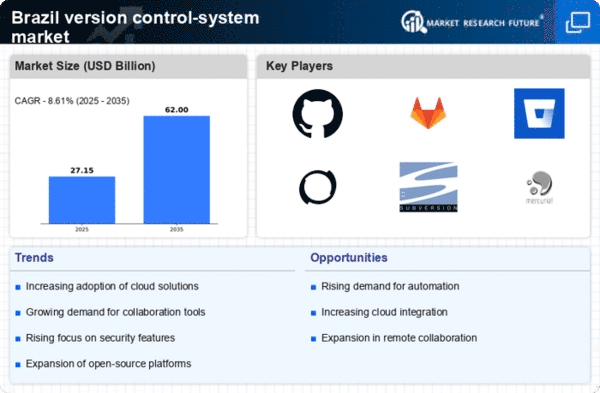Increased Focus on Data Security
Data security remains a critical concern for organizations in Brazil, influencing the version control-system market. As businesses face rising threats from cyberattacks, there is a growing need for systems that not only manage code but also ensure the security of sensitive data. Version control systems that incorporate advanced security features, such as encryption and access controls, are becoming increasingly popular. Recent surveys indicate that approximately 70% of Brazilian companies prioritize security when selecting software tools. This heightened focus on data protection is likely to drive demand for version control systems that offer robust security measures, thereby enhancing the overall market landscape.
Rising Demand for Collaboration Tools
The version control-system market is experiencing a notable surge in demand for collaboration tools. As organizations increasingly adopt remote and hybrid work models, the need for effective collaboration solutions has become paramount. This trend is reflected in a reported growth of approximately 15% in the adoption of collaborative software tools among Brazilian companies. Version control systems facilitate seamless collaboration among development teams, allowing multiple users to work on projects simultaneously without conflicts. This capability is essential for enhancing productivity and ensuring that projects are completed efficiently. Furthermore, the integration of version control systems with other collaboration platforms is likely to drive further growth in the market, as businesses seek to streamline their workflows and improve communication among team members.
Integration with Emerging Technologies
The version control-system market is poised for growth due to the integration of emerging technologies. As organizations explore the potential of technologies such as machine learning and blockchain, the need for version control systems that can accommodate these innovations is becoming apparent. Companies are seeking solutions that not only manage code but also support the complexities introduced by these technologies. The integration of version control systems with machine learning tools, for instance, can streamline the development of AI-driven applications. This trend suggests a potential expansion of the market, as businesses look for versatile tools that can adapt to the evolving technological landscape.
Expansion of the Tech Startup Ecosystem
The burgeoning tech startup ecosystem in Brazil is a significant driver of the version control-system market. With an increasing number of startups emerging in various sectors, there is a heightened demand for robust development tools that can support rapid growth and innovation. Startups often prioritize agile development practices, making version control systems essential for managing their codebases effectively. The Brazilian startup scene has seen a remarkable increase, with over 10,000 new startups launched in the past year alone. This growth is likely to create a substantial market for version control systems, as these tools are integral to the development processes of tech startups aiming to scale quickly and efficiently.
Growing Emphasis on Software Development Efficiency
In Brazil, the version control-system market is significantly influenced by the increasing emphasis on software development efficiency. Companies are recognizing the importance of agile methodologies and continuous integration/continuous deployment (CI/CD) practices to enhance their development processes. The adoption of version control systems is seen as a critical component in achieving these goals, as they enable teams to manage code changes effectively and reduce the risk of errors. Recent data indicates that organizations utilizing version control systems report a 20% improvement in development speed and a 30% reduction in deployment failures. This focus on efficiency is likely to propel the market forward, as more companies invest in tools that support rapid development cycles and high-quality software delivery.
















